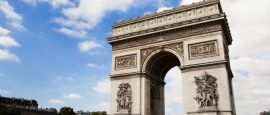France: Doing business & staying in touch
Doing business in France
Businesspeople are expected to dress smartly; men in suits and women in chic business wear. Prior appointments are expected and the use of business cards is usual. While knowledge of French is a distinct advantage in business dealings, it is sometimes considered impolite to start a conversation in French and then have to revert to English.
Business meetings tend to be formal and business decisions are taken only after lengthy discussion. When conducting business, entertaining is usually held in restaurants, and the first meeting is devoted to establishing a relationship.
It is customary to address colleagues with the appropriate Madame, Monsieur, Professeur or Docteur followed by the surname and a handshake. The informal word for 'you' - 'tu' - should only be used once the other person has started to use this him/herself. Business cards (preferably in French and English) should be presented.
After an initial meeting, kissing on the cheek is the norm. Always say goodbye to people one by one at the end of an event or else you will risk the term: filer à l’anglaise (literally 'to leave the English way'), which is not a good thing.
France has a 35-hour working week and office hours are generally between Monday-Friday 0830/0900-1700/1800, with a one- or two-hour lunch break during the day. Some offices close early on Friday afternoon.
In Paris, firmness, not rudeness, is in order. Small talk is an essential part of doing business in Paris, so it is wise to do a quick refresher on French politics and culture prior to the meeting and to take your time getting to the talk of business. Business lunches, working dinners and breakfast meetings are common. In addition, whoever fixes the meeting is expected to settle the bill. At formal dinners, diners must wait for the most important guest or the host to give the signal to start eating. Conducting business in August is best avoided as many people take the month off.
An economic powerhouse, France has the third largest economy in Europe after Germany and the United Kingdom.
The service industry accounts for 79% of its GDP in 2017 - this is hardly surprising given the fact that France is one of the most visited countries in the world and the tourism sector employs about 10% of the workforce directly or indirectly.
Manufacturing, spanning from vehicles, chemicals, metallurgy, mechanical engineering, electronics, food, to textiles, is also a major component of the economy.
After President Emmanuel Macron entered in 2017, he launched a series of economic reforms to improve economic growth. In 2018, Macron's new budget cuts increased the country's purchasing power and propelled private investment.
Machinery and transportation equipment, aircraft, plastics, chemicals, pharmaceuticals, iron and steel, and beverages.
Keeping in Touch in France
Card-only telephones are common, which can be used with pre-paid cards bought from post offices and tabacs. Coin boxes are being phased out throughout the country. Calls can be received at phone boxes that show the sign of a blue bell. Information in English and other languages can be accessed by pressing the button with a two-flags icon.
Roaming agreements exist with most international mobile phone companies. The coverage is excellent.
Wi-Fi is ubiquitous in France. Most hotels, restaurants, cafes and shops offer customers free access to their networks. Some larger towns and cities have free hotspots. Access is also available in internet cafés, which are found in most towns.
Stamps can be purchased at post offices and tabacs. Post normally takes a couple of days to reach its destination within Europe. In Monaco, expect the same rates as France. Visit any of the seven post offices to get Monegasque postage stamp.
Mon-Fri 0900-1900, Sat 0900-1200. Post office in small towns and villages may have shorter working hours, while the main office in Paris is open 24 hours. In Monaco, the hours are Mon-Fri 0800-1900, Sat 0800-1300.
France ranks 32nd in the 2019 World Press Freedom Index according to Reporters Without Borders (rsf.org). Most popular newspapers include Le Figaro, Le Monde and L’Equipe. The main English-language daily is the International Herald Tribune. Outside of Paris (the Ile-de-France) region, the provincial press is often more popular than the national press.
TV channels include publicly-owned France 2, France 3, France 4, France 5, France Ô (ending in 2020) and Arte. Privately run channels include TF1, Canal+ and M6, to name but a few.
There is a myriad of radio stations in France including but not limited to France Inter, France Culture, RTL, Les Indés Radios, RMC, NRJ, RFM, Skyrock, Rire et Chansons, Europe 1, among others.
There is only one daily newspaper in Monaco called Monaco-Matin. French papers—and the tabloid magazines—also cover news daily from the principality. A weekly publication, the Monaco Hebdo, covers Monaco's current affairs. The Journal de Monaco is an internal government journal published weekly. Other newspapers include La Gazette de Monaco and Monaco Life. French newspapers are widely available, as are English books and magazines. The Riviera Reporter is the only English-language magazine for residents in the French Riviera, which can also be found online. Riviera Radio is a privately-run English-language network.









 You know where
You know where
